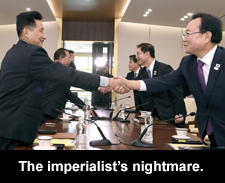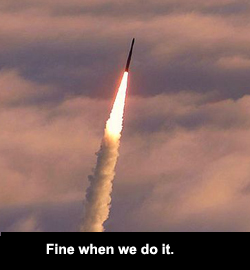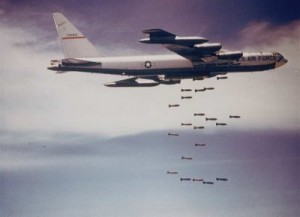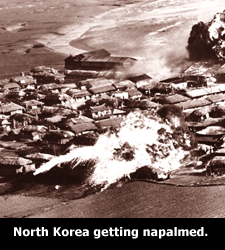As anyone who listens to my podcast, Strange Sound, knows, I’ve had serious differences with the Biden team on foreign policy from early on in their campaign. What first gave me pause was the fact that the “issues” section of their campaign web site included no foreign policy items whatsoever, except one or two bank-shot mentions of other countries in the context of discussions about domestic policy issues, like immigration and energy policy. Of course, absence of evidence is not evidence of absence, as Donald Rumsfeld once told us, and in this context the cliche is true – while Biden’s outward-facing platform was a blank slate on foreign policy, there was definitely a there there, even if we couldn’t see it. And, no great surprise, the Biden foreign policy is basically built around the return of the blob (a.k.a. the imperial foreign policy establishment that has dominated administrations of both major parties since the American empire began).
We saw evidence of this in stark relief this past week with the bombing of “Iranian-backed” elements in Syria. Immediately we saw mainstream commentators like Richard Haas on television describing this as a measured and appropriate response to what they described as Iranian provocations, parroting the administration line that the U.S. needed to do this to show the Iranians that they can’t do whatever they want in the region without consequences. (That privilege we reserve to ourselves, of course – hence the raid.) The Biden administration is taking the path of least resistance, returning to the settled imperial order of confronting Iran at every opportunity, imposing conditions on them unilaterally, and not taking responsibility for our own disastrous policy decisions over the past four years (which, themselves, compounded the disastrous policy decisions of the preceding 75 years).
The fact is, the Biden administration is building on that bad policy. While Anthony Blinken has not openly endorsed Trump’s recognition of Israeli sovereignty over the occupied Golan Heights, he is leading the State Department in returning to something that still looks a lot like that recognition, while keeping the American embassy in Jerusalem – a decision that cements in place this open defiance of the very concept of a two-state solution. The Biden State Department is still calling Juan Guaido the “interim president” of Venezuela when he is, in fact, no such thing and has no standing as the leader of that country – a delusional policy originated by the Trump crew. Biden is unlikely to withdraw U.S. recognition of Moroccan sovereignty over Western Sahara, a criminal quid-pro-quo over recognition of Israel, brokered by the Trump administration. Don’t even get me started on Saudi Arabia. In fact, as far as I can see, the only policy Biden appears poised to reverse is Trump’s opening to North Korea – literally the only good thing the man ever did (albeit by accident).
With respect to foreign affairs, war and peace, we appear to be locked into place, regardless of which major party runs the White House. Bad news for anyone who might have hoped this presidential transition would bring a saner approach to the world. Doesn’t seem likely.
luv u,
jp


 Think it strange that the U.S. would be against a lessening of tension? Well, it’s not just a Trump thing. There’s a deep imperial institutional bias against ending that conflict, and it manifests itself in a host of different ways. Just Wednesday of this week I saw an NBC story about the North Korean woman who allegedly blew up a South Korean airliner; she is out of jail, living in exile as a defector in South Korea. The bombing was decades ago – so why did the network decide to dredge this story up now and hang it around the father of the current North Korean leader’s neck? I would say that NBC is about as close to the core of the U.S. foreign policy establishment as any institution can be. With a lot of positive stories coming out about the glimmer of North/South detente in Korea, it’s no surprise that this old chestnut would bob up to the surface.
Think it strange that the U.S. would be against a lessening of tension? Well, it’s not just a Trump thing. There’s a deep imperial institutional bias against ending that conflict, and it manifests itself in a host of different ways. Just Wednesday of this week I saw an NBC story about the North Korean woman who allegedly blew up a South Korean airliner; she is out of jail, living in exile as a defector in South Korea. The bombing was decades ago – so why did the network decide to dredge this story up now and hang it around the father of the current North Korean leader’s neck? I would say that NBC is about as close to the core of the U.S. foreign policy establishment as any institution can be. With a lot of positive stories coming out about the glimmer of North/South detente in Korea, it’s no surprise that this old chestnut would bob up to the surface. The two Koreas have taken some tentative steps to de-escalation, and I for one am glad to see that. In fact, I wish they would just bury the hatchet and tell us to take a hike, frankly. But it’s the kind of detente that can easily be upended by a volatile president, and Korea is one of those issues over which even the craziest commander-in-chief can find willing allies in Congress. Israel/Palestine is another. Trump’s policy on Jerusalem is appalling, but it also happens to be the same policy Congress long ago approved and a previous president (Clinton) signed into law. This is a symbolic issue domestically and a very substantive issue internationally; I am guessing that most Americans have no idea what the implications of this policy are, no notion of how large the municipality now called Jerusalem has grown over the past three decades. Underwriting Israel’s unilateral annexation of this city essentially eliminates any chance of a two-state solution, period. Some of my countrymen know this; many more do not, or simply do not care.
The two Koreas have taken some tentative steps to de-escalation, and I for one am glad to see that. In fact, I wish they would just bury the hatchet and tell us to take a hike, frankly. But it’s the kind of detente that can easily be upended by a volatile president, and Korea is one of those issues over which even the craziest commander-in-chief can find willing allies in Congress. Israel/Palestine is another. Trump’s policy on Jerusalem is appalling, but it also happens to be the same policy Congress long ago approved and a previous president (Clinton) signed into law. This is a symbolic issue domestically and a very substantive issue internationally; I am guessing that most Americans have no idea what the implications of this policy are, no notion of how large the municipality now called Jerusalem has grown over the past three decades. Underwriting Israel’s unilateral annexation of this city essentially eliminates any chance of a two-state solution, period. Some of my countrymen know this; many more do not, or simply do not care. What’s in it? Prepare to be amazed. Massive tax cuts for the wealthy and for corporations. Reducing the top corporate tax rate to 15% and eliminating the estate tax altogether. If anything resembling this vague framework were to come into effect, it would shower enormous dividends on the most well-heeled people in the United States and cost the U.S. treasury about 2 trillion dollars. Suddenly Republicans aren’t worried about the deficit/debt anymore – astonishing! And why wouldn’t they give a massive break to the only people in the country – the one percent – who did well throughout the financial crisis? No reason at all.
What’s in it? Prepare to be amazed. Massive tax cuts for the wealthy and for corporations. Reducing the top corporate tax rate to 15% and eliminating the estate tax altogether. If anything resembling this vague framework were to come into effect, it would shower enormous dividends on the most well-heeled people in the United States and cost the U.S. treasury about 2 trillion dollars. Suddenly Republicans aren’t worried about the deficit/debt anymore – astonishing! And why wouldn’t they give a massive break to the only people in the country – the one percent – who did well throughout the financial crisis? No reason at all. Korea is potentially the most volatile of these. There are literally millions of people living under the gun there, and while the North’s leadership is ultra paranoid and appears irrational, they have been driven to this point by the presence of an existential threat: us. We have scores of military bases in South Korea. The South Korean military is under the operational command of our Pentagon. On top of that, we engage in the annual provocation of our joint exercises with Seoul, which amounts to a massive mock-invasion of North Korea. Given our troubled history with Pyongyang (and the memory of a war that cost 3 million Korean lives), you might think we would try to err on the side of diplomacy. North Korea wants direct bilateral talks with us because we are their principal adversary. They are not a direct threat to us, but they can do a lot of damage to Seoul, so for the sake of all those people we should ratchet down this conflict now.
Korea is potentially the most volatile of these. There are literally millions of people living under the gun there, and while the North’s leadership is ultra paranoid and appears irrational, they have been driven to this point by the presence of an existential threat: us. We have scores of military bases in South Korea. The South Korean military is under the operational command of our Pentagon. On top of that, we engage in the annual provocation of our joint exercises with Seoul, which amounts to a massive mock-invasion of North Korea. Given our troubled history with Pyongyang (and the memory of a war that cost 3 million Korean lives), you might think we would try to err on the side of diplomacy. North Korea wants direct bilateral talks with us because we are their principal adversary. They are not a direct threat to us, but they can do a lot of damage to Seoul, so for the sake of all those people we should ratchet down this conflict now. Obama hasn’t gone that far, but with all that’s at stake on the Korean peninsula, it is reckless merely to follow the same path as even some of your more sane predecessors in office. It’s late in the game, but a real effort should be made to defuse this confrontation before someone makes a mistake. Mistakes in Korea can cost hundreds of thousands of lives in a very short time; no policy of either containment or rollback is worth that level of risk.
Obama hasn’t gone that far, but with all that’s at stake on the Korean peninsula, it is reckless merely to follow the same path as even some of your more sane predecessors in office. It’s late in the game, but a real effort should be made to defuse this confrontation before someone makes a mistake. Mistakes in Korea can cost hundreds of thousands of lives in a very short time; no policy of either containment or rollback is worth that level of risk. North Korea. When you produce a movie that makes a joke out of the assassination of the leader of a garrison state, its back against the wall for decades, you should respect a negative reaction. Agents purportedly working for North Korea have threatened violence against theaters running “The Interview”, promising 9/11 type attacks, somewhat incredibly. SONY Pictures pulled the film, generating a mountain of criticism. An AP article suggested that SONY feared hostilities against Japan by a nuclear-armed North Korea.
North Korea. When you produce a movie that makes a joke out of the assassination of the leader of a garrison state, its back against the wall for decades, you should respect a negative reaction. Agents purportedly working for North Korea have threatened violence against theaters running “The Interview”, promising 9/11 type attacks, somewhat incredibly. SONY Pictures pulled the film, generating a mountain of criticism. An AP article suggested that SONY feared hostilities against Japan by a nuclear-armed North Korea.

 Korea invading Korea – but not on the devastating attack we mounted against them. Christine Ahn of the Korea Policy Institute spoke to this fact on
Korea invading Korea – but not on the devastating attack we mounted against them. Christine Ahn of the Korea Policy Institute spoke to this fact on